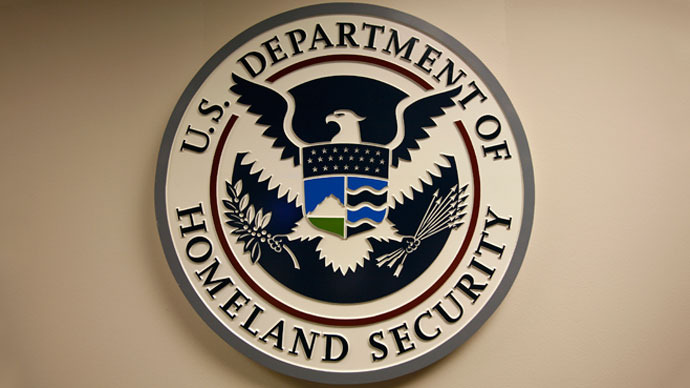DHS defends suspicionless searches of laptops and cell phones

The United States government doesn’t need a reason to seize and search the cell phones, laptops and other electronic devices of Americans entering the country, according to a Department of Homeland Security document provided to the press this week.
The DHS has long insisted that border agents and immigration officers are allowed to collect the electronics of US citizens crossing into the country without reason or cause, but a December 2011 document made public this week once and for all shines a light on a sparsely discussed security-measure that has attracted the attention of privacy advocates and others who’ve equated the practice as a constitutional violation.
The American Civil Liberties Union and the Associated Press jointly filed a Freedom of Information Act request for the document earlier this year after the DHS published a two-page executive summary briefly explaining the results of an audit conducted by the department’s Office for Civil Rights and Civil Liberties. In that statement, the DHS auditor concluded that Customs and Border Protection agents and officers with Immigration and Customs Enforcement were not violating either the First or Fourth Amendments to the US Constitution by seizing the electronics of Americans without clear suspicion of a crime.
“We conclude that CBP’s and ICE’s current border search policies comply with the Fourth Amendment,” Tamara Kessler wrote for the Office for Civil Rights and Civil Liberties in the summary. “We also conclude that imposing a requirement that officers have reasonable suspicion in order to conduct a border search of an electronic device would be operationally harmful without concomitant civil rights/civil liberties benefits.”
Now with the full 23-page paper in their possession — albeit a version that’s seen a fair share of redactions — the AP and ACLU have published the document in order to expose a post-9/11 policy that has remained intact under President Barack Obama, but to little discussion.
“This is striking,” ACLU fellow Brian Hauss wrote Wednesday, “because it is the first time, as far as we know, that the government has explained why purely suspicionless searches supposedly enhance security.”
The government’s reasoning, according to the document, is that the blanketing ability to collect and assess the devices of anyone thought to be entering the country is crucial to thwart high crimes. That being said, the government attests that requiring actual probable cause before seizing a device would, in the eyes of the DHS, hinder their ability to counter terrorism.
“[A]dding a heightened [suspicion-based] threshold requirement could be operationally harmful without concomitant civil rights/civil liberties benefit,” the document found. “First, commonplace decisions to search electronic devices might be opened to litigation challenging the reasons for the search. In addition to interfering with a carefully constructed border security system, the litigation could directly undermine national security by requiring the government to produce sensitive investigative and national security information to justify some of the most critical searches.”
“Even a policy change entirely unenforceable by courts might be problematic,” it continued. “Under a reasonable suspicion requirement, officers might hesitate to search an individual's device without the presence of articulable factors capable of being formally defended, despite having an intuition or hunch based on experience that justified a search.”
Speaking to AP, ACLU staff attorney Catherine Crump said the government’s reasoning is “just not good enough” and demonstrates purely inadequate reasoning.
“A purely suspicionless search opens the door to ethnic profiling,” Crump said.
Hauss, the legal fellow for the group’s Speech, Privacy and Technology Project, said the government’s line of thought in defending the policy is faulty for a few different reasons. “DHS claims that giving Americans the opportunity to challenge laptop searches in court would lead to the divulgence of national security secrets, but this is obviously wrong,” he wrote. “The government has numerous resources at its disposal to prevent the disclosure of sensitive information. The ‘state secrets privilege,’ to take just one example that is used in court cases, has been criticized on many grounds, but no one has ever seriously suggested that its protections are too anemic. Although DHS might fear the prospect of being called into open court to explain its actions, executive accountability before the law is the bedrock on which our system of constitutional self-government is built.”
Last year, the US Supreme Court upheld an earlier ruling that legally permitted the use of suspicionless roadblocks anywhere within 100 miles of an international border, subjecting nearly 200 million Americans around the country to spontaneous and sporadic inspections of vehicles and their possessions.
On Tuesday, ACLU spokesperson Peter Boogaard told Bloomberg News that a 2009 policy change restricted how long the DHS can hold on to seized electronics. Earlier this week, though, it was suggested that the department did not necessarily see any problems with duplicating that information to be held on to indefinitely.
David House, a founding member of the Bradley Manning Support Network, sued the DHS in 2011 after his computer and cell phone were seized after an international flight he was on landed at O’Hare International Airport in Chicago. On behalf of the ACLU, House sued DHS Secretary Janet Napolitano on the accusation that his belongings were searched solely on the basis of his association with the Support Network, an organization that has paid in full the legal bills for the 25-year-old Army private accused of committing espionage and aiding terrorists by sharing sensitive files with the website WikiLeaks. House’s devices were held for 49 days by ICE — longer than the 30 days allowed legally — and the contents of those electronics were copied by investigations. House dropped his lawsuit last after the DHS agreed to delete its copy of the data.
“They’re giving us exactly what we wanted,” House told Wired.














